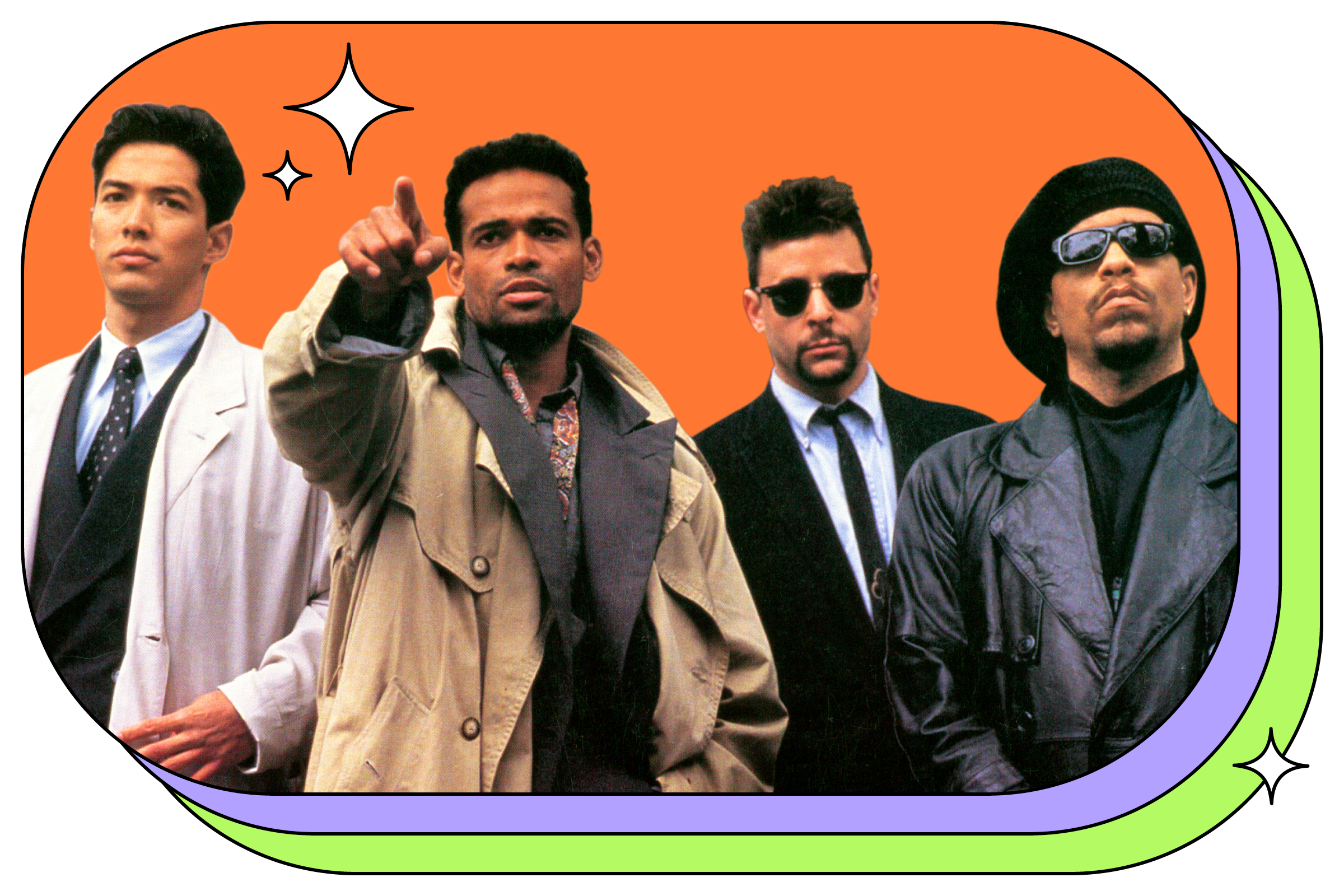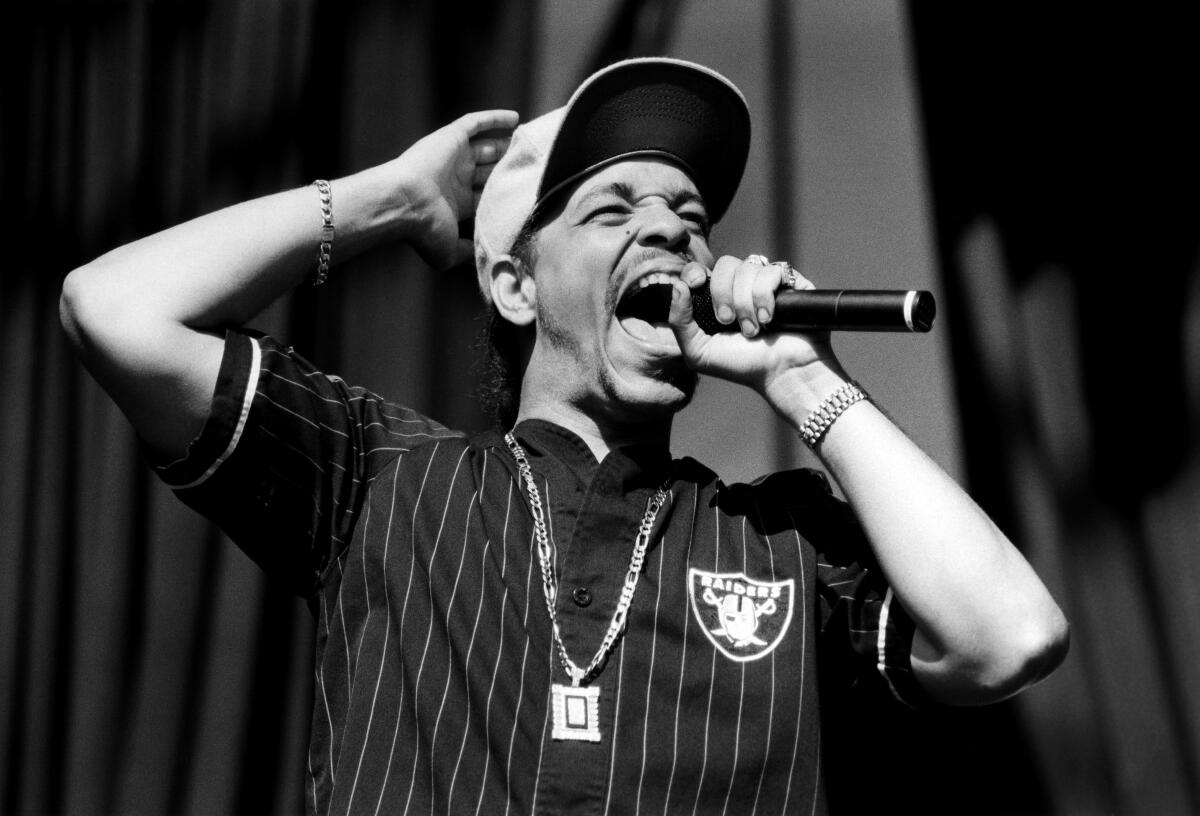The biggest entertainment stories
Get our big stories about Hollywood, film, television, music, arts, culture and more right in your inbox as soon as they publish.
You may occasionally receive promotional content from the Los Angeles Times.

Rappers had been in movies before 1991.
Fab 5 Freddy played a version of himself in 1983’s semi-documentary “Wild Style.” Melle Mel rocked a party wearing a zebra-print vest in 1984’s “Beat Street.” And who can forget Run-D.M.C.’s quest for vigilante justice in 1988’s “Tougher Than Leather”?
But not until Ice-T appeared in “New Jack City” had an MC ever taken on a prominent dramatic role in a major Hollywood production.
Starring the West Coast gangster-rap pioneer as a New York detective going undercover against a drug lord played by Wesley Snipes — and directed by Mario Van Peebles, whose father, Melvin, helped set off the blaxploitation movement of the 1970s with his film “Sweet Sweetback’s Baadasssss Song” — “New Jack City” was a critical and commercial success, raking in nearly $50 million at the box office on a budget of around $8 million.

Like “Sweet Sweetback,” it also ushered in an era of unflinching films about inner-city life, many with rappers in lead roles, including 1991’s “Boyz N the Hood,” which starred Ice Cube, and 1992’s “Juice,” which starred Tupac Shakur.
Ice-T, now 65, has since acted in dozens of movies and on TV’s durable “Law & Order” franchise while recording albums on his own and with his heavy-metal band Body Count, which famously drew the condemnation of President George H.W. Bush with its 1992 screed “Cop Killer.”
This month he and LL Cool J will host a new A&E series called “Hip Hop Treasures,” in which they trace the music’s history by tracking down collectibles like the Bad Boy jersey worn by Biggie Smalls in his video for “Juicy.” Ice-T remembered his introduction to Hollywood in a phone conversation.

What was your attitude as you went into shooting “New Jack City”?
I was scared as s—. Mario offered me the role, but he wanted me to play the police. And this was right when the album I was dropping was “Original Gangster.” Dropping that and playing a cop simultaneously? I thought it was career suicide. Also: Who’s to say “New Jack City” was gonna be “New Jack City”? I’ve done a lot of movies that I don’t even want you to watch. So the thought that your first movie would actually turn out to be a blockbuster seemed crazy. But everyone around me was like, “Ice, man, you from the hood — there’s no opportunity. You got to take it.”
Why do you think Mario cast you?
He approached me in a club about doing the movie, and I thought he was bulls—ing, that it would be a small little part. But I went to Warner Bros. the next day and I read the script. I’m like, “That’s all the lines!” The thing of it was, at the time we did “New Jack City,” there weren’t enough young Black actors. They figured, “Well, Ice sold millions of records, maybe this’ll translate.” It was a risk. But everyone on that movie was a new jack. We had Judd Nelson [who’d starred in “The Breakfast Club” and “St. Elmo’s Fire”], but it was Mario’s first time directing. Wesley Snipes had only done “Major League” and a Spike Lee flick. And Chris Rock was the youngest, hippest street comic. They wanted to do something like an urban “Scarface” movie and make it look big, and somehow we pulled it off.

When did you know the movie was good?
I went to see it at Grauman’s Chinese when it came out. I sat in the back row behind some cats. When I came on the screen, I heard, “Look at Ice in that f— hat!” They was dissing me, so I’m like, “Ah, f—.” But by about 15 minutes into the movie, they were calling me by my name in the movie. And then it just blew up. Now, for the record, I got paid like $23,000 for that movie. So welcome to Hollywood. But my next movie was “Ricochet” with Denzel [Washington].
That one pay better?
I’ll never forget: I walked into Joel Silver’s office — one of the biggest producers in Hollywood, did “The Matrix” — and I tell him, “A’ight, Joel, the movie blew up but I didn’t get paid. I know I’m ’bout to get paid on this one.” He looked at me and said, “Ice-T, you’ve done one movie.” I didn’t really get paid till “Tank Girl” [in 1995]. But you got to prove you have a value at the box office.
In 1983, KDAY-AM became the first radio station to play wall-to-wall rap music, thanks to an ambitious new music director and some soon-to-be famous DJs.
Did you develop a sense pretty quickly that “New Jack City” was part of a larger blossoming of Black cinema?
Yeah, but somebody had to take that first step into the deep end to make Hollywood understand that these motherf— are talented. It started off, you know, “This is rap, it’s not music.” Now, Will Smith is like the biggest actor in Hollywood, and he started off as a rapper. It’s why Jay-Z’s a billionaire and why 50 Cent is successful — because we’re the ultimate hustlers. Little kids out the hood, you give us an opportunity and we’ll show you.
How did “New Jack City” steer your later decisions about which roles to take?
It built my understanding that every actor has a perspective. If you send a role to Jack Nicholson, you get the Jack Nicholson lens on it. Make me a cop and you’ll get an Ice-T-ish cop. But that –ish is valuable. So I understood that my perspective is what’s actually my money and that I was free to do everything. If you put me on a cooking show, you’re gonna get an Ice-T-ish cook. That might be dope!
The biggest entertainment stories
Get our big stories about Hollywood, film, television, music, arts, culture and more right in your inbox as soon as they publish.
You may occasionally receive promotional content from the Los Angeles Times.